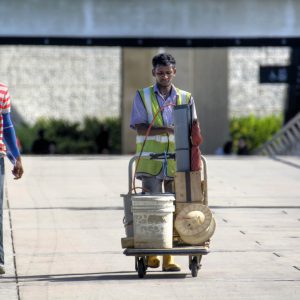Migrant Workers in Singapore and the Politics of Recognition
December 20, 2021

Migration is a commonplace phenomenon in a globalised world, as people move in search of better opportunities for economic and social improvement. Created by the United Nations, International Migrants Day on 18 December recognises the human rights of all migrants. In the same vein, Assistant Professor Hong Renyi (NUS Department of Communications and New Media) addresses Singapore’s treatment of migrant workers through an analysis of the media in “CokeDrones and the Good Life: Migrant Workers in Singapore and the Politics of Recognition” (Digital Asia Hub, 2016).
The essay problematises a 2014 Coca-Cola advertisement, directed by Ogilvy & Mather and produced collaboratively with the Singapore Kindness Movement. It points out that the advertisement reduces the problems of migrant workers to a mere struggle with loneliness in Singapore, and its simplifying, feel-good response that depicts Singaporeans delivering cans of Coke by drones to the workers. In light of the infamous 2013 “Little India Riot” that happened just four months before the advertisement, Asst. Prof Hong argues that the advertisement substitutes substantive political change with a soothing cultural response. More importantly, its ascribing of migrant workers’ unhappiness to the issue of being lonely holds neither the nation nor its citizens accountable for the systemic and structural issues they face.
Critically, the essay highlights the technological fetishism propagated by the advertisement, which acquired over half a million views and 4,000 likes on YouTube. Asst. Prof Hong explains that technological fetishism occurs when complex social relationships are imposed and distorted in material objects, usually to the end of offering people a sense of understanding and control. In this case, the essay points out that “liking” and “sharing” the advertisement creates feelings of virtuous participation that become conflated with the advertisement’s message of appreciation and care for migrant workers. The creation of hope through technological fetishism redirects attention from the real issues faced by migrant workers to a false redemption through gaining media attention.
The essay quotes a spokesperson for the Singapore Kindness Movement, who explains that the advertisement was a means of diffusing negativity left by the riot. Understood in light of the general political stance of the state following the riot – having tied its underlying cause to alcohol rather than systemic mistreatment – the essay demonstrates that the advertisement takes a softer, but no less troubling stance.
Read the essay here.
